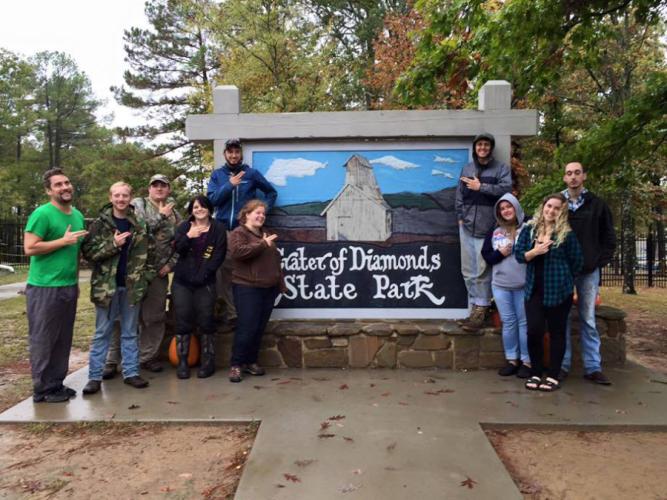NACOGDOCHES, Texas - As spring begins and warm, sunny weather beckons campers to explore the great outdoors, patrons of Arkansas' most-visited state park, Crater of Diamonds, may notice a few changes based upon recommendations made by students enrolled in the Stephen F. Austin State University course Management of Outdoor Recreation Areas.
"We wanted to look for something that was a little bit different in terms of geography," said Dr. Shelby Gull Laird, assistant professor of forestry at SFA's Arthur Temple College of Forestry and Agriculture. "Our students do a lot of great projects and work around East Texas, but we wanted to widen that scope a little bit, and allow them to deal with a different state government and give them more exposure."
Crater of Diamond's State Park was founded in 1972, and it is the only diamond- producing site in the world where the public can search for precious gems and keep what they find. In addition to the diamond mine, the park also contains hiking trails, campsites and other opportunities for outdoor recreation.
"The project site gave us a unique experience in that it is not like a lot of parks around East Texas," said Ashley Johnson, a senior pursing a Bachelor of Science in forestry with an emphasis in recreation management. "We had to do a lot of outside research and look at things from a different perspective."
Students camped at the park, located in Murfreesboro, Arkansas, last October to convene with park administration and discuss park management concerns. Additionally, students dedicated much time to personally exploring the park and collecting the data needed to complete their comprehensive recreation management plans.
Following data collection, students completed a full assessment of the park's recreational resources, detailing the resources' quality, as well as noting areas in need of improvement.
"The primary issue was sediment runoff from the diamond mine area that collected in the surrounding forest," Johnson said.
James Howell, Crater of Diamonds State Park superintendent, agreed, explaining that the protection of forest ecosystems surrounding the park's 37.5-acre plowed diamond search field, while also maintaining the field and fostering new diamond discoveries, is a delicate balance.
"The students did an excellent job of addressing an array of park management issues," Howell said. "These plans have provided the park with a solid framework for administrators to incorporate and build upon for the future of Crater of Diamonds State Park."
Howell said that this is the first time that Crater of Diamonds State Park has partnered with a university in this capacity, and he believes the results will be beneficial to all parks in the Arkansas State Park system.
 Axe ’Em, Jacks!
Axe ’Em, Jacks!
